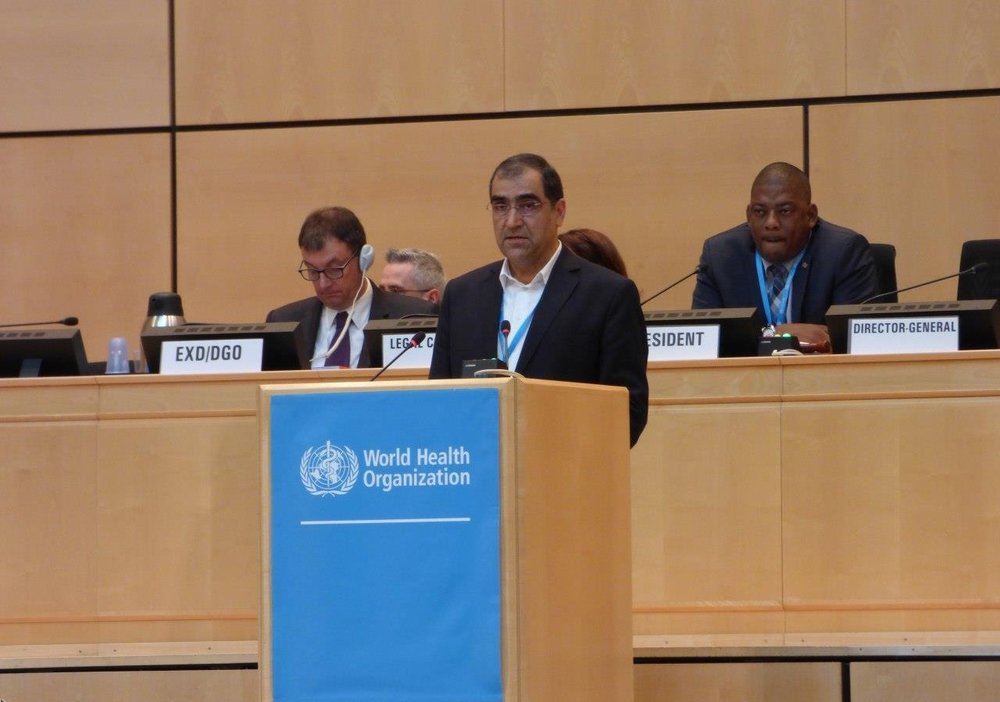Iran health minister appointed WHO commissioner on NCDs

TEHRAN — Iranian Health Minister Hassan Qazizadeh-Hashemi has recently been appointed as the World Health Organization’s commissioner for Independent Global High-level Commission on Non-Communicable Diseases (NCDs).
According to the WHO official website, the first ever WHO Independent Global High-level Commission on NCDs, aiming to propose practical ways to fight the world leading causes of death and illnesses was announced in 2017, by Dr. Tedros Adhanom Ghebreyesus, Director-General of WHO and will run until October 2019.
The commission on NCDs is co-chaired by President Tabaré Vázquez of Uruguay; President Maithripala Sirisena of Sri Lanka; President Sauli Niinistö of Finland; Veronika Skvortsova, Minister of Healthcare of the Russian Federation; and Sania Nishtar, former Federal Minister of Pakistan.
The commission is comprised of heads of state and ministers, leaders in health and development and entrepreneurs. The Commissioners are tasked with recommending actions to facilitate and accelerate progress in addressing and preventing NCDs as the main leading killers on earth, mainly cardiovascular disease, cancers, diabetes and respiratory disease, and promoting mental health and well-being.
World leaders are expected to participate in the third United Nations General Assembly High-level Meeting on NCDs in order to meet the need to speed up action to beat NCDs which is high on the global political agenda in 2018. The commission will provide actionable recommendations to contribute to the assembly which is scheduled for the second half of 2018.
NCDs claim 15 million lives mostly aging between 30 and 69 each year worldwide. Most particularly some 50 percent of premature deaths caused by NCDs occur in low- and lower-middle income countries. Additionally NCDs are responsible for the deaths of 7 in 10 people across all ages globally, equivalent to approximately 40 million people.
In 2015, world leaders committed to reduce premature deaths from NCDs by one third by 2030 as part of the United Nations’ Sustainable Development Goals. Recent WHO reports indicate that the world will struggle to meet that target.
In a news release made by WHO on Friday Director-General Tedros emphasized on everybody’s right to a healthy life, adding that, “We can beat the drivers of the NCD epidemic, which are among the world’s main obstacles to health. I am looking to the Commission to show us new ways to unblock the barriers to good health, and identify innovative, bold and practical actions steps to scale up prevention and treatment of NCDs and provide health for all.”
Michael R. Bloomberg, WHO Global Ambassador for Noncommunicable Diseases and Commission member, also regretted the fact that for the first time in history more people are dying of noncommunicable diseases, such as heart disease and diabetes, than infectious diseases.
“This loss of human life spares no one- rich or poor, young or old - and it imposes heavy economic costs on nations. The more public support we can build for government policies that are proven to save lives - as this Commission will work to do - the more progress we'll be able to make around the world," Bloomberg added.
Co-chair Dr. Nishtar says the Commission’s establishment has come at an opportune time, as the world prepares for the UN High-level Meeting on NCDs. “While there have been improvements in some countries and regions, the overall rate of progress has been unacceptably slow. This is resulting in too many people suffering and dying needlessly from NCDs, and leaving families, communities and governments to bear the human and economic costs,” she lamented, stating, “This year, governments will be held to account on progress they have made in protecting their citizens from NCDs.”
According to the Non-Communicable Diseases Research Center, Endocrinology and Metabolism research Institute 76 percent of the burden of the diseases in Iran comes from NCDs.
In line with WHO’s activities to combat NCDs in 2015 Iran established a committee called National Non-Communicable Disease Committee at the Ministry of Health headed by the health minister Qazizadeh-Hashemi which was endorsed by the then Director-General of the World Health Organization Margaret Chan Fung Fu-chun.
MQ/MG
